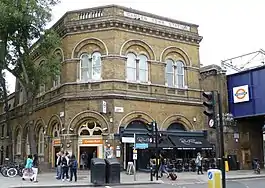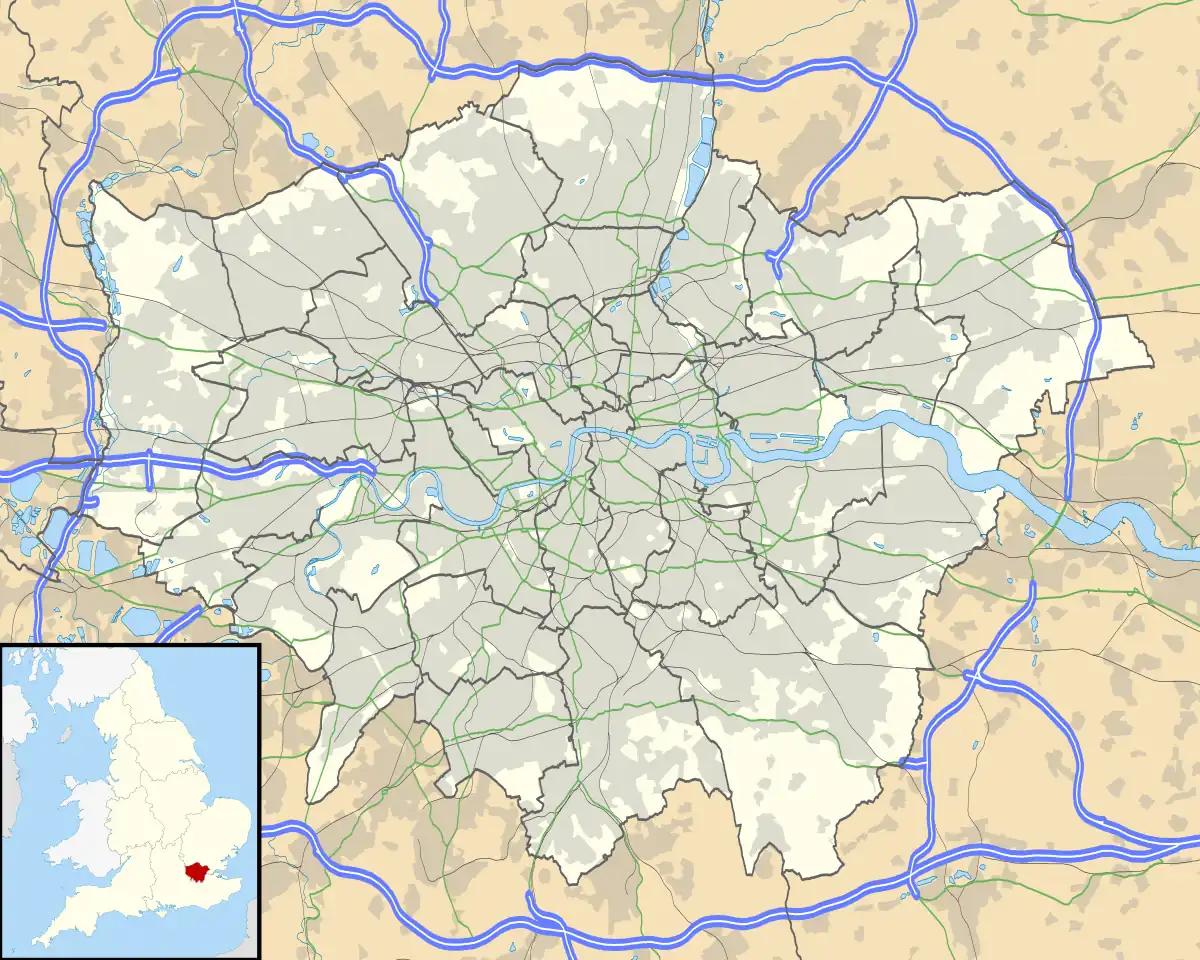Camden Road railway station
Camden Road railway station in the London Borough of Camden, north London, is operated by London Overground. It is on the North London line and in Travelcard Zone 2.
| Camden Road | |
|---|---|
 | |
 Camden Road Location of Camden Road in Greater London | |
| Location | Camden Town |
| Local authority | London Borough of Camden |
| Managed by | London Overground |
| Owner | Network Rail |
| Station code | CMD |
| DfT category | D |
| Number of platforms | 2 |
| Accessible | Yes[1] |
| Fare zone | 2 |
| OSI | Camden Town |
| National Rail annual entry and exit | |
| 2017–18 | |
| – interchange | |
| 2018–19 | |
| – interchange | |
| 2019–20 | |
| – interchange | |
| 2020–21 | |
| – interchange | |
| 2021–22 | |
| – interchange | |
| Key dates | |
| 7 December 1850 | first station opened |
| 5 December 1870 | resited |
| 25 September 1950 | Renamed (Camden Road) |
| Other information | |
| External links | |
| WGS84 | 51.5418°N 0.1388°W |
London Overground | |||||||||||||||||||||||||||||||||||||||||||||||||||||||||||||||||||||||||||||||||||||||||||||||||||||||||||||||||||||||||||||||||||||||||||||||||||||||||||||||||||||||||||||||||||||||||||||||||||||||||||||||||||||||||||||||||||||||||||||||||||||||||||||||||||||||||||||||||||||||||||||||||||||||||||||||||||||||||||
|---|---|---|---|---|---|---|---|---|---|---|---|---|---|---|---|---|---|---|---|---|---|---|---|---|---|---|---|---|---|---|---|---|---|---|---|---|---|---|---|---|---|---|---|---|---|---|---|---|---|---|---|---|---|---|---|---|---|---|---|---|---|---|---|---|---|---|---|---|---|---|---|---|---|---|---|---|---|---|---|---|---|---|---|---|---|---|---|---|---|---|---|---|---|---|---|---|---|---|---|---|---|---|---|---|---|---|---|---|---|---|---|---|---|---|---|---|---|---|---|---|---|---|---|---|---|---|---|---|---|---|---|---|---|---|---|---|---|---|---|---|---|---|---|---|---|---|---|---|---|---|---|---|---|---|---|---|---|---|---|---|---|---|---|---|---|---|---|---|---|---|---|---|---|---|---|---|---|---|---|---|---|---|---|---|---|---|---|---|---|---|---|---|---|---|---|---|---|---|---|---|---|---|---|---|---|---|---|---|---|---|---|---|---|---|---|---|---|---|---|---|---|---|---|---|---|---|---|---|---|---|---|---|---|---|---|---|---|---|---|---|---|---|---|---|---|---|---|---|---|---|---|---|---|---|---|---|---|---|---|---|---|---|---|---|---|---|---|---|---|---|---|---|---|---|---|---|---|---|---|---|---|---|---|---|---|---|---|---|---|---|---|---|---|---|---|---|---|---|---|---|---|---|---|---|---|---|---|---|---|---|---|---|---|---|---|
| |||||||||||||||||||||||||||||||||||||||||||||||||||||||||||||||||||||||||||||||||||||||||||||||||||||||||||||||||||||||||||||||||||||||||||||||||||||||||||||||||||||||||||||||||||||||||||||||||||||||||||||||||||||||||||||||||||||||||||||||||||||||||||||||||||||||||||||||||||||||||||||||||||||||||||||||||||||||||||
Legend | |||||||||||||||||||||||||||||||||||||||||||||||||||||||||||||||||||||||||||||||||||||||||||||||||||||||||||||||||||||||||||||||||||||||||||||||||||||||||||||||||||||||||||||||||||||||||||||||||||||||||||||||||||||||||||||||||||||||||||||||||||||||||||||||||||||||||||||||||||||||||||||||||||||||||||||||||||||||||||
| |||||||||||||||||||||||||||||||||||||||||||||||||||||||||||||||||||||||||||||||||||||||||||||||||||||||||||||||||||||||||||||||||||||||||||||||||||||||||||||||||||||||||||||||||||||||||||||||||||||||||||||||||||||||||||||||||||||||||||||||||||||||||||||||||||||||||||||||||||||||||||||||||||||||||||||||||||||||||||
History
The first Camden Road station was opened by the North London Railway in 1850 on the east side of what is now St. Pancras Way. It was renamed Camden Town on 1 July 1870, but closed on 5 December the same year when it was replaced by the current station, a short distance to the west.[4]
Designed by Edwin Henry Horne, it opened as Camden Town by the North London Railway on 5 December 1870, but was renamed Camden Road on 25 September 1950 to avoid confusion with the London Underground Northern line Camden Town which had opened in 1907. Thus, between 1907 and 1950, there were two stations called Camden Town. It remains Horne's only station still operating as such.[5]
Between 14 May 1979 and 11 May 1985 Camden Road was the western terminus of the Crosstown Linkline diesel multiple unit service to North Woolwich.
To allow four-car trains to run on the London Overground network, the North London line between Gospel Oak and Stratford closed in February 2010, and reopened on 1 June that year, in order to install a new signalling system and to extend 30 platforms. After the reopening the work continued until May 2011 with a reduced service and none on Sundays.[6]
Location
The station is at the corner of Royal College Street and Camden Road. The present Camden Town London Underground station is 450 metres to the southwest of this station.[7][8] It is one of the few railway stations in England in which there is a police station.
Services
The typical weekday service in trains per hour is:
- 4 westbound to Richmond via Willesden Junction
- 4 westbound to Clapham Junction also via Willesden Junction
- 8 eastbound to Stratford via Highbury & Islington.[9]
There is now no normal passenger service on the line from Camden Road to Willesden Junction Low Level via Queens Park, though the route can be (and is) used if the line via Hampstead Heath is blocked for any reason.
In addition to the frequent local passenger service, the station is a busy location for freight traffic due to its proximity to the junctions linking the North London line to both the West Coast Main Line at Camden Junction (via the now closed station at Primrose Hill) and the East Coast Main Line at Copenhagen Junction. The former is particularly well used by container trains from the deep water ports at Felixstowe and Tilbury to various terminals in the Midlands and North West of England; it also carried a passenger service (between Watford Junction and Broad Street/Liverpool Street) until 1992.
Connections
London Buses routes 29, 46, 253 and 274 and night routes N29, N253 and N279 serve the station.
There is also an official out of station interchange with Northern Line services at the nearby Camden Town underground station.
Camden Highline
In the future there may be a walking connection to and from King's Cross. The Camden Highline is a proposed public park and garden walk transforming a disused section of the North London Line between the two stations.[10]
Potential reinstatement of platform 3
In a London Rail Freight Strategy released by Network Rail in May 2021, proposed reinstatement of platform 3 as a through platform, with platform 2 becoming a turn back for a potential peak hour service from Camden Road to Stratford with potential to continue these during the off peak. [11]
References
- "Step free Tube Guide" (PDF). Transport for London. April 2021. Archived (PDF) from the original on 15 May 2021.
- "Out-of-Station Interchanges" (Microsoft Excel). Transport for London. 2 January 2016. Retrieved 28 August 2016.
- "Estimates of station usage". Rail statistics. Office of Rail Regulation. Please note: Some methodology may vary year on year.
- The Forgotten Stations of Greater London by J.Connor and B.Halford-page 25
- Williams, Michael (2010). On The Slow Train: Twelve Great British railway journeys. London: Preface Publishing. p. 111. ISBN 978-1-8480-9207-5.
- "London Overground to close from Gospel Oak to Stratford as part of £326m upgrade to deliver longer, more frequent trains". TfL. 15 February 2010. Retrieved 29 May 2011.
- Walking directions to Camden Town tube station from Camden Road railway station
- However, the accompanying 2008 photograph shows the original name ("Camden Town Station") still displayed on the parapet of the station building of what is now Camden Road station.
- "Richmond and Clapham Junction to Stratford route" (PDF). 15 May 2022.
- Richardson, Tim (14 August 2017). "The Garden Bridge is dead, long live the Camden Highline". The Telegraph.
- London Rail Freight Strategy Summary Report Network Rail, May 2021 p.14
External links
- Train times and station information for Camden Road railway station from National Rail
| Preceding station | Following station | |||
|---|---|---|---|---|
| Kentish Town West towards Richmond or Clapham Junction |
North London line | Caledonian Road & Barnsbury towards Stratford | ||
| Former services | ||||
| Preceding station | Following station | |||
| West Hampstead towards Basingstoke |
Anglia Railways London Crosslink |
Highbury & Islington towards Norwich | ||
| Disused railways | ||||
| Kentish Town West | North London-Watford Link (LNWR suburban system) |
Maiden Lane | ||
| Primrose Hill | Caledonian Road & Barnsbury | |||